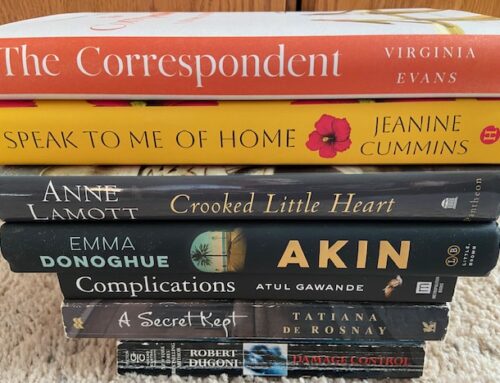“What mental health needs is more sunlight, more candor, and more unashamed conversation.”
– Glenn Close
I have suffered from a chronic pain condition for more than a decade. I don’t talk about it a lot, but I’m not ashamed of it. I didn’t cause it, and it doesn’t make me less of a human. I just don’t want to be labelled by my pain. Friends with breast cancer or type 1 diabetes prefer not to be labelled by disease either. And then there’s mental illness.
Sometimes the universe pokes at me until I acknowledge her messages. Recently, the universe has hinted that I need to tell my story about mental health. The hints started when I volunteered to appear, silently, in a promotional video for our not-for-profit, community mental health provider. I believe in mental health services, and I believe in the video producer, so it was an easy yes. My family’s story brought me to this place but sharing it is harder.

When the doctor recommended ECT (electroconvulsive therapy) for my mom, all I could think of were images from “One Flew Over the Cuckoo’s Nest”. I was scared and out of my league. My mother was in a psych ward, and now this? I was 20-something, and this was too big for me. My familiarity with mental health was limited at best, and an Academy Award winning movie’s depiction of treatment didn’t help.
Let’s walk it back -- My mom was sweet, kind, accommodating, rather passive. She appeared fragile, and it took a few years of maturity before I fully grasped the inner strength she carried as a divorcee and breast cancer survivor at a time the words divorce and breast weren’t said out loud. Mom didn’t fit the stereotypical profile of someone with a mental illness; she was a white middle-class mom in suburbia.
When Mom started showing signs of depression, I no longer lived in the same town, so the noticing was gradual. Her lack of joy, or even pleasure. High anxiety and low patience. Her response to a casual “how are you?” from an acquaintance with a litany of sadness. Her older sister questioned how “someone so pretty, with everything going for her” could be depressed.
When she finally was diagnosed with depression, Mom started therapy and medication. Shame made it hard for her to accept that. She hated taking meds, had been raised to think she should just get over the blues. When she felt a little better, she stopped taking them, as so many do. She spiraled downward. Her pastor was the first to hear her express some suicidal ideation and intervened to get her to the hospital. Ultimately, Mom needed the ECT, and it was somewhat effective for a time. She didn’t look or act different after being hospitalized, but stigma existed. ECT screamed mental illness. In hindsight, I wonder why it didn’t scream mental health.
A couple of years later, the story repeated itself. I was about to be married, and I was stressed by balancing my job, running back to my hometown to see Mom in the hospital, and planning a wedding. I wondered if Mom would be okay for the wedding and worried what my new in-laws would think about her flat affect. I struggled with explaining her depression to them; I was afraid it might make her seem somehow broken. In my ignorance, I was embarrassed. Again in hindsight, I see how I had just accepted those same negative and hurtful ideas about mental illness.
Over about 5 years, my mom was hospitalized twice for clinical depression and finally accepted that she needed the meds, just as she would if she had high blood pressure. She let go of her shame. She became a more compliant patient and took care of her mental health up to the time Alzheimer’s took away the value of therapy.
A few years later, I also lost a younger stepbrother to his mental struggles. His story is not mine to tell, only its impact on me. Jeff was a kind young man with a big heart, blessed with a natural exuberance and a gift for growing things. Bipolar disorder does not discriminate however, and Jeff bounced between the dark hole of depression and the creative energy of mania. Medication balanced him, but he also stopped taking it when he felt better. Seeing his foot bandaged from the errant gunshot in his first failed suicide attempt was a stark eye-opener for me, and I saw the enormity of his pain. Four years later, he was successful in ending that pain.
When we celebrated Jeff’s life, many had never known him beyond his bright grin and giving nature. Then my Dad took one of the bravest steps in his own life: he stood in front of that packed sanctuary and talked of Jeff’s reality. He shared the frightening ups and downs of his beloved stepson, but most importantly, he imparted the humanity of mental illness. Dad knew the power of shedding light in darkness. *Full disclosure: my father had years before traded ministerial life for a career in the mental health system, so his words carried professional authority, along with personal grief.
Jeff is not remembered for his illness or how he found peace; my mother is not remembered for being depressed or undergoing ECT. They are remembered for the beautiful, multidimensional humans they were.
Through their experiences, I came to a better understanding of what it means to have a mental illness, to suffer from a disease out of your control and to embrace interventions for the sake of mental health. I became more aware of the stereotypes and their harm. I was more empathetic in my work in a hospital with an inpatient mental health unit. So I was proud to play my silent part in a video encompassing the spectrum of those working toward mental health. After all, the universe said to share.
Just as we take care of our bodies from the day we’re born until the day we die, we must also nurture our hearts and minds. The most emotionally mature person I know credits therapy for her self-awareness, and I credit her for elevating mine. In some seasons, any of us might need help managing the feelings, ideas, and thoughts that are too big, too frightening, overwhelming. It’s okay. Let someone know. Choose help and health.





[…] my friend Cindy pointed out in her post on mental illness found here, I don’t know anyone who wishes to be defined by their pain. I certainly do not want to be […]
[…] A popular high school champion athlete, Maddy was highly recruited, but she suffered severe mental health challenges in the transition to college athletics. The book’s author is an ESPN journalist and […]